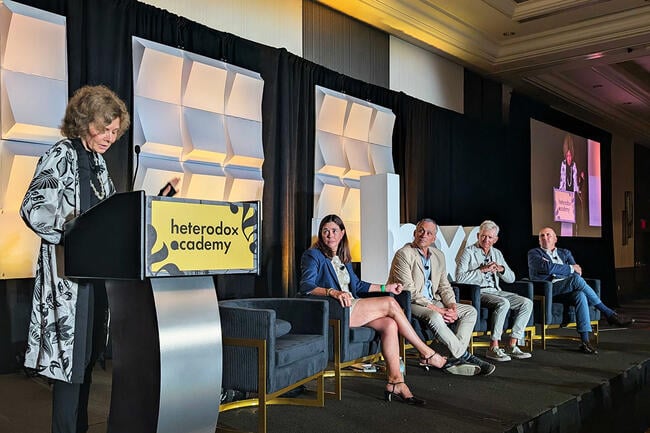You have /5 articles left.
Sign up for a free account or log in.

From left, Nadine Strossen, Sian Leah Beilock, Michael Roth, Jeremy Haefner and Brian W. Casey.
Ryan Quinn/Inside Higher Ed
NEW YORK CITY—A university president took the platform he was given at the annual convening of Heterodox Academy, a viewpoint-diversity group, to tell attendees that their long-standing gripes had found “resonance” with those trying to destroy higher education.
“Your complaints at the Heterodox conferences for almost 10 years now—about being too woke, about not having enough jobs for white people, about too many women in the academy—have found resonance with an authoritarian push to control our spaces,” Wesleyan University president Michael Roth said Tuesday during a plenary panel at the event.
“We can make nice and not say that and we won’t get investigated,” he said. “Or we can do our job, which is to call the indecent attack on our sector indecent, wrongheaded, lawless, authoritarian, fascistic—choose your words. But if you sit there and worry about the sociology department and whether Near East studies is really antisemitic, I think you’re doing their work of authoritarianism.”
Many in the room applauded.
At Wesleyan, Roth said, he’s tried to increase intellectual diversity and raise awareness “about the political biases that undermine faculty hiring, that undermine classroom discussions, that undermine the education we want to offer.” But he said that “right now that would be like talking about needing a better milkshake when the house is on fire,” or like complaining about corruption in Ukraine’s mining industry or the University of Kiev’s anthropology department talking too much about settler-colonialism.
“The federal government is trying to destroy civil society by undermining the legitimacy of colleges and universities, of law firms—entertainment is on deck, and journalism,” Roth said. “And so while we twiddle our thumbs and talk about reforming the university, people who want to destroy the university are doing so not because we don’t have enough Republicans at the top business school or Wesleyan’s department of mathematics. They want to destroy the university because that’s how you claim more executive power.”
President Donald Trump has ushered in a new era for those who have long denounced academe as being intolerant of conservative views, or antisemitic, or discriminatory against white and male applicants for faculty jobs. While Republicans have for years passed laws in red states curtailing teaching, tenure, shared governance and diversity, equity and inclusion, the federal government has gone further since Trump retook office. For five months, the Trump administration has pursued an overhaul of higher ed using heavy-handed tactics such as cutting off billions of dollars in research funding and attempting to deport and bar the entry of international students and scholars for speech the administration disagrees with.
Proponents of ideas such as viewpoint diversity, intellectual diversity, open inquiry and civil discourse often argue that true academic freedom supports these concepts. But what do some of them say about what’s happening now—significant governmental interference in higher ed, under the premise of providing what they’ve long called for? And when specifically is government intervention justified? This week’s conference attempted to answer some of those questions.
‘Bait and Switch’
One response came out of a discussion among sociologists held right before Roth said that sitting and worrying about the sociology department was “doing the work of authoritarianism.” The panel was titled “How Should We Respond to the Cancelation of Sociology by the State of Florida?”
The panelists disagreed with the title, saying sociology wasn’t actually canceled there—in 2024, the state replaced Principles of Sociology as an option to fulfill general education course requirements with an American history course—and that the discipline essentially had it coming for what did happen.
“We were not canceled, we lost a privilege,” said Fabio Rojas, the Virginia L. Roberts Professor of Sociology at Indiana University at Bloomington. He said, “Sociology is a bait-and-switch discipline.”
“We say we’re a universal discipline of social science, we say that we’re a big tent where anybody can get any opinion published or have a good hearing,” Rojas said, but the field instead has “an extreme emphasis on social problems.”
“What if we actually tried to be better?” Rojas asked.
Rosemary Hopcroft, a professor emerita in the University of North Carolina at Charlotte’s sociology department, said that “in sociology, the received wisdom is that sex is a social construct. So this has helped lead to some of the worst excesses of woke ideology.”
“I just don’t think activism should be in sociology, period,” Hopcroft said, beyond people’s personal lives. She said, “It’s too tempting for it to hijack everything else, which is what’s happened.”
Rojas, when asked during the panel when he thinks it’s appropriate for the government to intervene in higher ed curricula, said at “a private institution, hands off, period.” (Trump has repeatedly intervened in private institutions, including Harvard and Columbia Universities). But, Rojas said, “if you’re in a state-chartered institution, expect political interference, because that is the definition of the institution.”
“When the legislators start pushing back, I tell people I do respect professional autonomy, I do believe that we know more about social science than the Legislature does,” Rojas said. “But … they write our paycheck, they gave us the land that we teach on [and] we’re taking tax dollars. So you have to expect some form of input from the political system—even if it’s not what you agree with.”
Hopcroft added that legislators “have a right to say whether they think something is useful as part of a student’s general education or not, given that they’re largely paying for this.”
‘The Popular Will’
On the presidential panel Roth sat on, moderator Nadine Strossen, the John Marshall Harlan II Professor of Law Emerita at New York Law School, said universities the Trump administration has targeted “had themselves violated academic freedom and free speech principles.”
“But that problem is hardly solved by government-imposed measures that violate those very same principles,” Strossen said.
Dartmouth University president Sian Leah Beilock sparred with Roth, whom she sat next to.
“This is not about just shouting from the rooftops, it’s about actually doing the work to be the kinds of institutions that we want to be,” Beilock said to applause.
Beilock said Dartmouth has an “institutionwide emphasis on having different viewpoints and building that muscle to have different perspectives on campus.”
At one point, Roth referenced booths outside the grand ballroom operated by other organizations that are pushing universities to adopt “institutional neutrality” policies, under which institutions won’t comment on contemporary political controversies.
“I worry that this is a new form of conformism,” Roth said. He said he’s suspicious of how the policies have proliferated since the Oct. 7, 2023, Hamas attack on Israelis.
“As a heterodox person, and as a Jew, I’m very suspicious when my compatriots find a new religion, be it viewpoint diversity or be it institutional neutrality,” Roth said. He asked Beilock what she would do if the Trump administration demanded Dartmouth adopt this policy to receive financial aid.
Beilock said her university already has the policy, but “we shouldn’t have the government telling us what to do.” However, she added, “It’s really a problem to say just because the administration, with many things that we all object to, is suggesting something inherently means it’s wrong.”
Byron Stier, a law professor and associate dean for strategic initiatives at Southwestern Law School, began his panel Tuesday afternoon with a retort to Roth. He said Russian president Vladimir Putin isn’t invading Ukraine over a sociology department, but Trump is citing viewpoint diversity and antisemitism to justify “incursions” in U.S. universities.
“So I think it is an important topic for us to be concerned about, and universities have created this vulnerability with regard to viewpoint diversity even before President Trump,” Stier said.
At an evening panel, Mark Bauerlein, an Emory University professor emeritus who’s a member of the New College of Florida Board of Trustees, said Florida governor Ron DeSantis’s overhaul of that institution “was an expression of the popular will taking place.”
“If this were politically unpopular, we would feel the pressure from the state,” Bauerlein said. “We are state officers there; it would hurt DeSantis.”
On Wednesday, during the final panel of the conference, an audience question crystallized the past days’ debate.
“Authoritarianism is bad,” said Matthew Burgess, an assistant professor in the University of Wyoming’s economics department. “So, what should be done to us if not what’s currently being done to us, and what should we do to ourselves?”
Some laughed.




